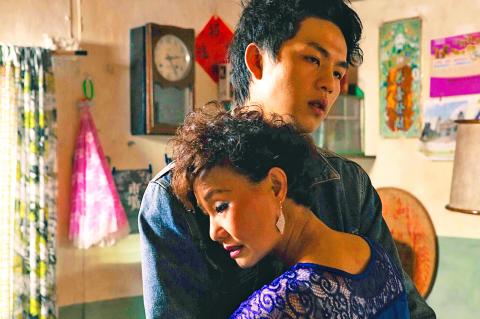Chang Tso-chi’s (張作驥) new film Thanatos, Drunk (醉‧生夢死) feels like a lethal projectile striking at the core of humanity. After covering subjects such as maternal warmth and reconciliation in When Love Comes (當愛來的時候) and childhood innocence in A Time in Quchi (暑假作業), the auteur returns to his familiar world inhabited by social underdogs, gangsters and prostitutes — a vision that is much fiercer and more emotionally poignant than before.
The drama revolves around a smothering, alcoholic mother and two brothers, one straight, one gay. In the prologue, Rat, played by newcomer Lee Hong-chi (李鴻其), dances with his drunk mother (Lu Hsueh-feng, 呂雪鳳) in their dingy home beside the Tamsui River (淡水河). In an inebriated haze, the mother laments her lot as a discarded wife. She nags Rat to get a job and worries about her older son, Shang-ho (Huang Shang-ho, 黃尚禾), who has just returned from living in the US.
As in Chang Tso-chi’s previous works, our protagonist, Rat, is trapped in a vicious cycle of despair and violence. We follow the tormented tough closely as he wanders through narrow back alleys, hawks vegetables at a wet market and hangs out with Shuo (Cheng Jen-shuo, 鄭人碩), a gigolo whom he idolizes and with whom he shares a flat.

Photo courtesy of Swallow Wings Films
Shang-ho works by day at a film company in Ximending (西門町) and parties at gay clubs by night. It soon becomes apparent that Shang-ho and Shuo are attracted to each other.
Meanwhile, Rat falls in love with a mute hooker (Chang Ning, 張甯), and violently attacks her johns. Soon the past catches up with the volatile punk and his gigolo friend, who are forced to settle an old score.
In Thanatos, Drunk, the narrative is not linear. Past and present are juxtaposed, merged and interwoven. In one scene, Shuo and other gigolos entertain clients; in another he sleeps with his girlfriend (Wang Ching–ting, 王靖婷), Rat’s cousin, in their cramped room by the bleak river. There are no flashbacks, and only through repetitive, similar sequences do we pick up clues here and there that give an idea of what has been happening.

Photo courtesy of Swallow Wings Films
This temporal removal helps to create a sense of immediacy as the characters wander through the mundane landscape of their lives, from being alone on the rooftop gazing off into the skyline to drunken ramblings over empty bottles in a claustrophobic room.
But this deceptively realistic surface reveals internal struggles underneath. Emotional entanglements erupt and implode through casual conversations, daily routines and habitual reactions.
And that is the genius of Chang Tso-chi, who makes it all seem so spontaneous and effortless.
The film works because the director has assembled actors who deliver authentic performances. In particular, first-time actor Lee looks both vulnerable and cruel as an angry young man wracked with guilt.
Critics have argued that the alcoholic mother, played by Lu Hsueh-feng, is the soul of the film. Lu summons emotional strength and sincerity to lift her role from a sobbing, alcoholic wreck to a maternal force too potent and restless that it ends up suffocating and consuming her own children.
Chang Tso-chi is known for using animal metaphors. Rat’s weird fixation on his pet ants, maggots and a half-dead pomfret presents a microcosm of the director Chang’s cinematic world, sordid and violent, while dotted with rare moments of lucidity.
Thanatos, Drunk is, without a doubt, one of Chang Tso-chi’s best and most despairing works to date. It is curious to note that the film was made during a very troubling time for the director, who was convicted of sexually assaulting a female screenwriter at his studio in Taipei in 2013. Three months after Chang Tso-chi began his nearly four-year prison sentence, the film won several prizes at this year’s Taipei Film Festival (台北電影節), including the Grand Prize and Best Narrative Feature award.

One of the biggest sore spots in Taiwan’s historical friendship with the US came in 1979 when US president Jimmy Carter broke off formal diplomatic relations with Taiwan’s Republic of China (ROC) government so that the US could establish relations with the People’s Republic of China (PRC). Taiwan’s derecognition came purely at China’s insistence, and the US took the deal. Retired American diplomat John Tkacik, who for almost decade surrounding that schism, from 1974 to 1982, worked in embassies in Taipei and Beijing and at the Taiwan Desk in Washington DC, recently argued in the Taipei Times that “President Carter’s derecognition

This year will go down in the history books. Taiwan faces enormous turmoil and uncertainty in the coming months. Which political parties are in a good position to handle big changes? All of the main parties are beset with challenges. Taking stock, this column examined the Taiwan People’s Party (TPP) (“Huang Kuo-chang’s choking the life out of the TPP,” May 28, page 12), the Democratic Progressive Party (DPP) (“Challenges amid choppy waters for the DPP,” June 14, page 12) and the Chinese Nationalist Party (KMT) (“KMT struggles to seize opportunities as ‘interesting times’ loom,” June 20, page 11). Times like these can

June 23 to June 29 After capturing the walled city of Hsinchu on June 22, 1895, the Japanese hoped to quickly push south and seize control of Taiwan’s entire west coast — but their advance was stalled for more than a month. Not only did local Hakka fighters continue to cause them headaches, resistance forces even attempted to retake the city three times. “We had planned to occupy Anping (Tainan) and Takao (Kaohsiung) as soon as possible, but ever since we took Hsinchu, nearby bandits proclaiming to be ‘righteous people’ (義民) have been destroying train tracks and electrical cables, and gathering in villages

Dr. Y. Tony Yang, Associate Dean of Health Policy and Population Science at George Washington University, argued last week in a piece for the Taipei Times about former president Ma Ying-jeou (馬英九) leading a student delegation to the People’s Republic of China (PRC) that, “The real question is not whether Ma’s visit helps or hurts Taiwan — it is why Taiwan lacks a sophisticated, multi-track approach to one of the most complex geopolitical relationships in the world” (“Ma’s Visit, DPP’s Blind Spot,” June 18, page 8). Yang contends that the Democratic Progressive Party (DPP) has a blind spot: “By treating any